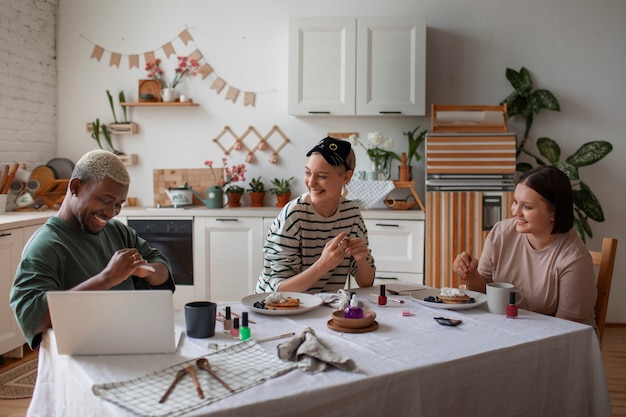
Taking care of your health goes beyond just medical treatments and medications. People are starting to see how closely linked their physical and mental health are, leading to a rise in DIY health practices. In today’s fast-paced world, self-care is becoming a necessity, not just a luxury.
While professional help is still important, there are many ways you can take control of your health using easily available resources and knowledge. By embracing these DIY methods, you can build a strong body, a peaceful mind, and a balanced life.
Our bodies need a variety of nutrients to work well. Every meal you eat can either help or harm your cells. Many people think that eating healthy means buying expensive superfoods or making complicated recipes, but that’s not true. Simply paying attention to what you eat and including different food groups can make a big difference.
Start by learning about the main food groups: proteins, carbohydrates, fats, vitamins, and minerals. Make sure your diet includes a mix of these essential nutrients. Choose whole foods over processed ones because they keep more of their natural benefits. For example, whole grains like quinoa, millet, or brown rice are better for you than refined grains. Try to limit added sugars, salts, and unhealthy fats, as they can cause health problems over time. Instead, use herbs, spices, and natural sweeteners like honey or maple syrup to add flavor to your meals. Also, stay hydrated by drinking plenty of water throughout the day. You can add natural flavors like cucumber, mint, or citrus fruits to make it more enjoyable.
Regular physical activity offers more benefits than just managing your weight. It can improve your heart health, strengthen your muscles, increase bone density, and boost your mental well-being. Exercise releases endorphins, which are known as “feel-good hormones” that help reduce stress, anxiety, and depression.
You don’t have to join a gym to stay active. Simple activities like walking, cycling, or even dancing at home can be very effective. Find a routine that fits your interests and schedule. If you’re new to exercise, start with low-impact activities that are easier on your body. As you get more comfortable, you can try more intense workouts or different types of exercise like yoga, pilates, or martial arts. Setting small, achievable goals can help keep you motivated. Whether it’s increasing your daily steps, mastering a new yoga pose, or improving your running time, celebrating these milestones can help you stay consistent.
In the busy world we live in, it’s important to find moments of silence and reflection. Mindfulness and meditation can help you connect with yourself, clear your mind, and build emotional strength. Start with short, guided meditations available online to learn the basics and create a routine. As you get more comfortable, you can explore deeper practices or attend local meditation workshops. Mindfulness doesn’t have to be limited to meditation sessions. You can practice it during everyday activities like eating, walking, or washing dishes, turning these tasks into moments of awareness and presence.
One of the most important steps towards overall health is recognizing and addressing addictions. Dependence on substances like alcohol, drugs, or even caffeine can seriously harm your physical and mental health. Admitting you have a problem is the first and most crucial step. For those with severe addictions, especially to substances like alcohol, seeking professional help is essential. Finding a rehab center in a peaceful location like Utah, Hawaii, or California can provide expert care and a serene environment that supports recovery. The journey to sobriety is challenging, but with determination, support, and the right resources, it is achievable. Embracing sobriety can rejuvenate your body, repair relationships, and give you a new zest for life.
In our busy lives, sleep often gets neglected, but it’s crucial for physical recovery and mental rejuvenation. Aim for 7-9 hours of uninterrupted sleep each night. Create a bedtime routine that helps signal to your body that it’s time to wind down. This could include reading, gentle stretches, or deep breathing exercises. Avoid screens at least an hour before bed, as the blue light can disrupt your sleep patterns.
Humans are social creatures, and the quality of our relationships directly affects our mental and emotional well-being. Build relationships that uplift, inspire, and support you. Open communication, mutual respect, and understanding are key to healthy relationships. On the other hand, distance yourself from toxic or draining relationships that negatively impact your peace and happiness.
Achieving optimal physical and mental health is a continuous journey of learning, growth, and self-discovery. While external resources are helpful, the power of DIY health practices is significant. By incorporating these practices into your daily life, you can improve your health and regain control, creating a life full of vitality, balance, and fulfillment.